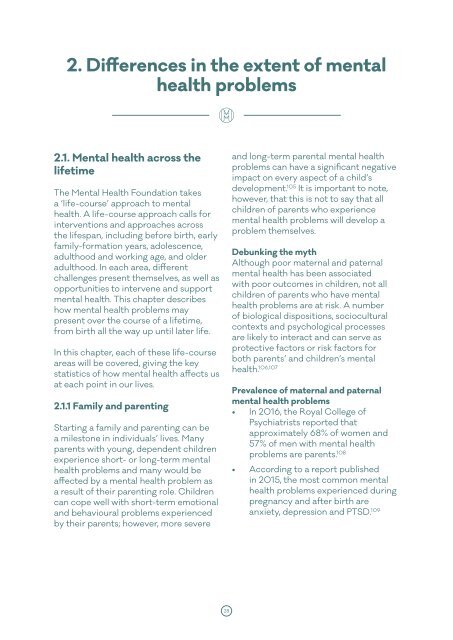FUNDAMENTAL FACTS ABOUT MENTAL HEALTH 2016
fundamental-facts-about-mental-health-2016
fundamental-facts-about-mental-health-2016
Create successful ePaper yourself
Turn your PDF publications into a flip-book with our unique Google optimized e-Paper software.
2. Differences in the extent of mental<br />
health problems<br />
2.1. Mental health across the<br />
lifetime<br />
The Mental Health Foundation takes<br />
a ‘life-course’ approach to mental<br />
health. A life-course approach calls for<br />
interventions and approaches across<br />
the lifespan, including before birth, early<br />
family-formation years, adolescence,<br />
adulthood and working age, and older<br />
adulthood. In each area, different<br />
challenges present themselves, as well as<br />
opportunities to intervene and support<br />
mental health. This chapter describes<br />
how mental health problems may<br />
present over the course of a lifetime,<br />
from birth all the way up until later life.<br />
In this chapter, each of these life-course<br />
areas will be covered, giving the key<br />
statistics of how mental health affects us<br />
at each point in our lives.<br />
2.1.1 Family and parenting<br />
Starting a family and parenting can be<br />
a milestone in individuals’ lives. Many<br />
parents with young, dependent children<br />
experience short- or long-term mental<br />
health problems and many would be<br />
affected by a mental health problem as<br />
a result of their parenting role. Children<br />
can cope well with short-term emotional<br />
and behavioural problems experienced<br />
by their parents; however, more severe<br />
and long-term parental mental health<br />
problems can have a significant negative<br />
impact on every aspect of a child’s<br />
development. 105 It is important to note,<br />
however, that this is not to say that all<br />
children of parents who experience<br />
mental health problems will develop a<br />
problem themselves.<br />
Debunking the myth<br />
Although poor maternal and paternal<br />
mental health has been associated<br />
with poor outcomes in children, not all<br />
children of parents who have mental<br />
health problems are at risk. A number<br />
of biological dispositions, sociocultural<br />
contexts and psychological processes<br />
are likely to interact and can serve as<br />
protective factors or risk factors for<br />
both parents’ and children’s mental<br />
health. 106,107<br />
Prevalence of maternal and paternal<br />
mental health problems<br />
• In <strong>2016</strong>, the Royal College of<br />
Psychiatrists reported that<br />
approximately 68% of women and<br />
57% of men with mental health<br />
problems are parents. 108<br />
• According to a report published<br />
in 2015, the most common mental<br />
health problems experienced during<br />
pregnancy and after birth are<br />
anxiety, depression and PTSD. 109<br />
28


